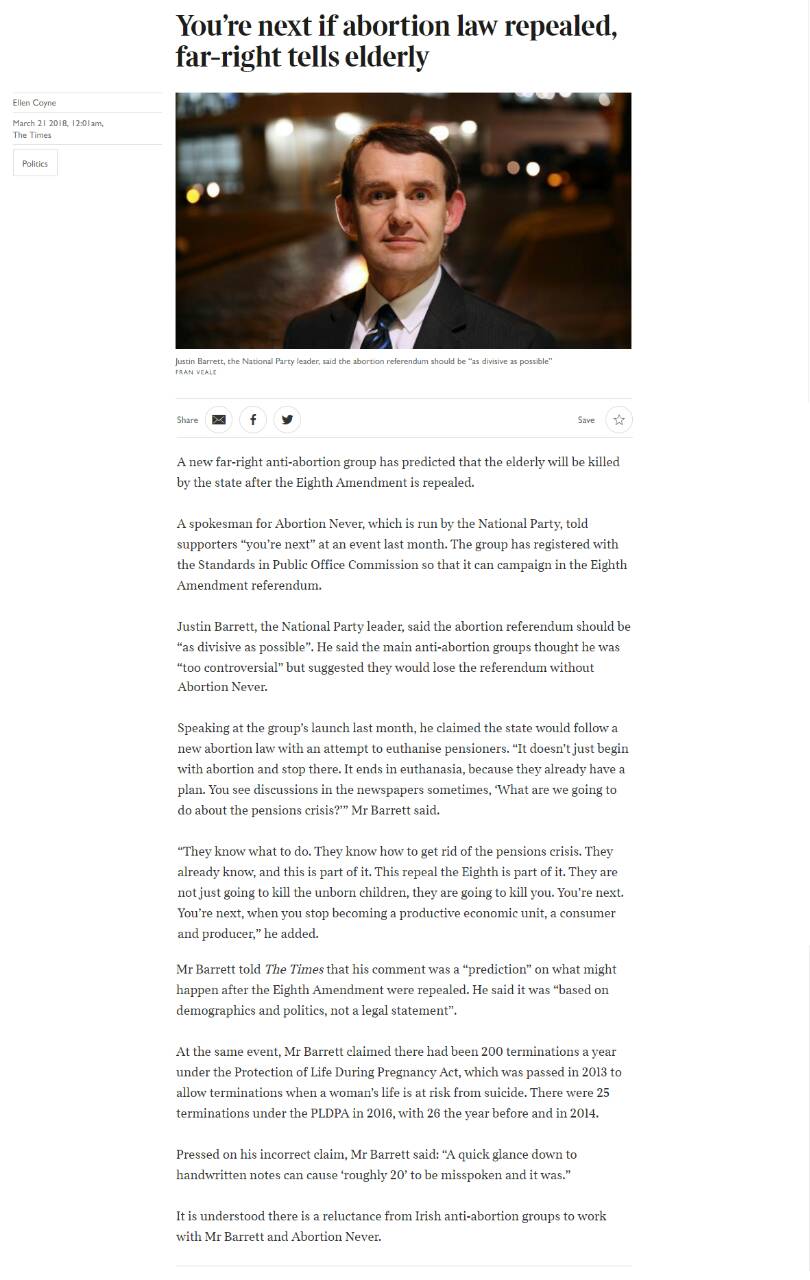First start with this attitude:

Then listen to this speech:
https://www.youtube.com/watch?v=g7A0vWUkxXg
Conclude that these are both the most important questions and the best way to present them:
Hello,
My name is Ellen Coyne and I’m a journalist at the Ireland edition of The Times. I wanted to contact you about an incorrect claim made by Justin Barrett at the launch of the Abortion Never campaign.
He said: “I’m sick of tired of the idea that the Protection of Life During Pregnancy Act, as it results in, as the government claims, so very few abortions, compared to the avalanche that certain people said would occur. I didn’t say that an avalanche would occur. But I’ll tell you something, as the figures show roughly 200 babies a year are dying of the protection of life during pregnancy act, and that’s too many.”
This is not true. There were 25 terminations under the PLDPA in 2016, which followed 26 terminations the year before and the same figure in 2014. Even combining the figures for the three years that the law has existed, it still falls well short of the 200 figure that Barrett cited.
He also claimed that the 12 week provision would be abortion on demand, comparing it to the UK law which “has no gestational limit.” That is not true either, the limit in the UK is 24 weeks.Does he intend to correct his claims and can he offer any assurances that Abortion Never will not campaign using mistruths? Does he also stand by his claim that repealing the Eighth Amendment would result in euthanizing the elderly as a solution to the pension crisis?
Also, the entire ethos of Abortion Never seems to be that the Supreme Court in 1992 was going against the will of the people in 1983. What is the stance of the group on the will of the people in two separate referendums where they voted in favour of abortion in cases of suicide risk because it suits your ideology?
I would appreciate if you could respond to be by my deadline of 4.30pm, tomorrow, Tuesday 20 March.
Thank you
Ellen
—
Ellen Coyne
Journalist
Ireland edition of The Times
Receive this reply:
Dear Ellen,
It is rare indeed for a journalist to accompany the question phase of an enquiry with such clear bias and obnoxious bad taste, but that would be the editorial policy right? “The editor of the recently established newspaper [Ireland edition of The Times], Richard Oakley, has stated he intends for his publication to openly favour one side of the debate in the abortion referendum.” – Irish Independent.
To the first question where your point has some substance. I don’t know if you have ever delivered a speech to a packed room and an enthusiastic audience (not paid to be there I mean) but a quick glance down to handwritten notes can cause “roughly 20” to be misspoken and it was. But since the substance of the point was that some individuals had exaggerated the mathematical consequences of the PLDPA, and that the number was not so important as that babies had died from the Act, it really is poor to hit upon this particular misspeak as any effort to deliberately mislead. Later I state clearly that “the principle upon which we stand is one is one too many”.
I presume you had time to dwell on this sentence, “He also claimed that the 12 week provision would be abortion on demand, comparing it to the UK law which “has no gestational limit.” That is not true either, the limit in the UK is 24 weeks.” There are no “gestational limits” on abortion for mental health reasons in either the UK law or the one proposed for Ireland. There are criteria which in practical terms it is impossible not to meet because they can be met by declaration alone. In fact the UK law does have criteria to be met up to 24 weeks, whereas the proposed Irish law is “without restriction” up to 12 weeks. Those UK criteria may be purely theoretical, but they are stated as existing, as such, in the 1967 Act. This does not prevent the practice of “abortion on demand”. Where is the untruth here or in the speech delivered? It is as important surely to listen to what I actually said as it is for me to be more careful not to statistically misspeak.
Later in my speech I speculate as to what might occur in the aftermath of the Eighth Amendment being repealed. This is a prediction based on demographics and politics, not a legal statement. It is dishonest to represent it otherwise. The Eighth Amendment does not contain the right to life of the elderly and consequently it’s repeal would not in law remove that right, no one is suggesting it does, not myself and not the Abortion Never campaign. It’s a fanciful leap on your part to ask me to stand by a claim I never made, one might even go so far as to say the implication of the question is in itself “untrue”.
I would suggest that you have no idea whatsoever what “the whole ethos” of the Abortion Never campaign is. You seem unfamiliar even with the meaning of the word “ethos”. In any case your following (and presumably related) question makes no sense at all. “What is the stance of the group on the will of the people in two separate referendums where they voted in favour of abortion in cases of suicide risk because it suits your ideology?” I will try to decipher some intended meaning, you’ll forgive me if you were talking about the Luas*, as you might well be…
At no time have the Irish people been asked by referendum whether they are in favour of abortion in the case of suicide risk. They were asked in 1983 whether they wanted the right to life of the unborn, equal to the right to life of the mother to be a Constitutional provision and they voted overwhelming for that. Following the X Case judgement, which stated the threat of self destruction as legal grounds for abortion, there were two referendums in which the then governments proposed to remove the threat of self destruction as grounds, while outlining different ones, albeit considerably more limited than the law now proposed to follow repeal. In the first of these, 1992, all the major Pro-Life organisations called for a “No” vote, which there was. Pro-Abortion groups also campaigned for a “No” vote. In the second, limited abortion was again proposed, while ruling out threat of self destruction as grounds. The Pro-Life movement split on this occasion and there was again a “No” vote, though the margin was very narrow. Pro-Abortion groups called for a “No” vote.Having been guilty of misspeaking a statistic not crucial to my point, and admitting as much, I feel it is only fair to correct a substantial series of errors of fact and history, which are crucial to the implication of your question, insofar as it can be understood at all. If in fact you question related to the Luas in some way, my corrections concerning the history of abortion referendums in Ireland may be irrelevant, and I will apologise for that, but you only gave me so much to work with.
No doubt you will publish whatever you wish now, with more regard to the editorial policy of your British newspaper (Western Edition) than anything I have said here. It is not the first time and surely will not be the last in which what I have said is either misrepresented or straightforwardly lied about. No matter, the lying press has less credibility than ever, and you will only be quoted by pro-abortion fanatics anyway.
*FYI: The Luas is a commonly used public transport system in Dublin City, Ireland.
Justin Barrett
Uachtarán An Pháirtí Náisiúnta
Be this annoyed:
Thanks. I am well aware what the Luas is. I live in Dublin.
—
Ellen Coyne
Journalist
Ireland edition of The Times
Then write this article:

Note there is not one single word of the article that is untrue as such, but would the reasonable person conclude it was a fair summation of the events that transpired?
That is how Fake News is made.
The lying press is filled daily with stories like this on every imaginable subject.
Justin Barrett
Uachtarán An Pháirtí Náisiúnta
